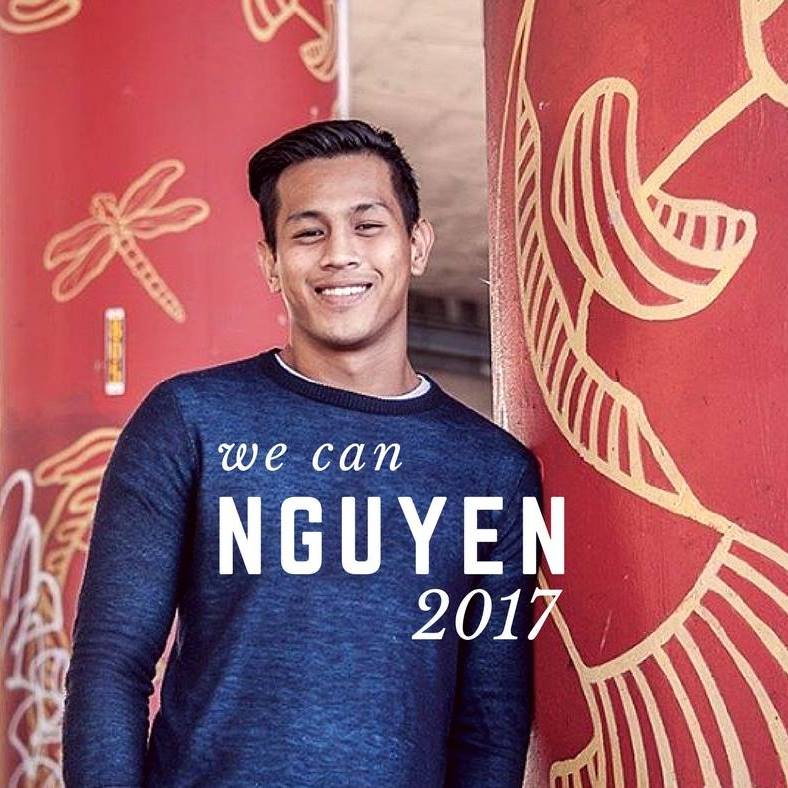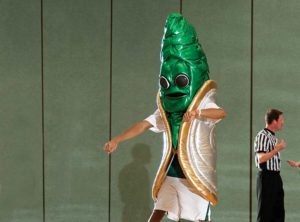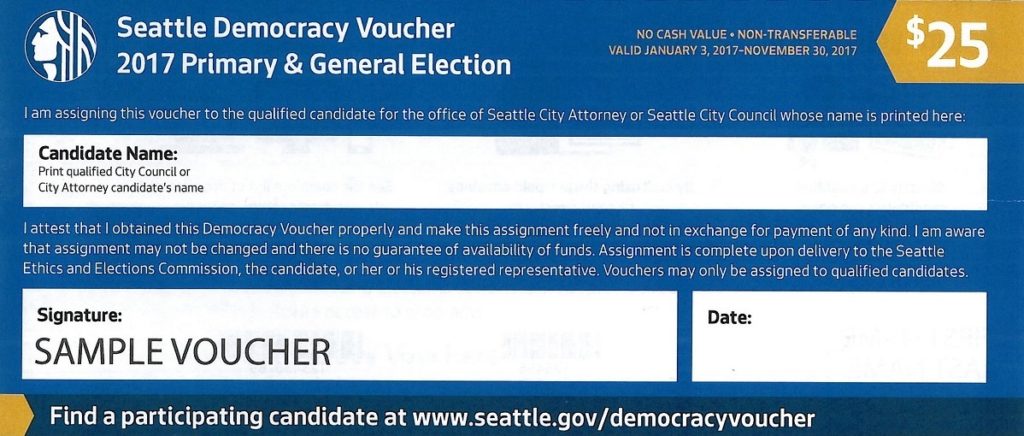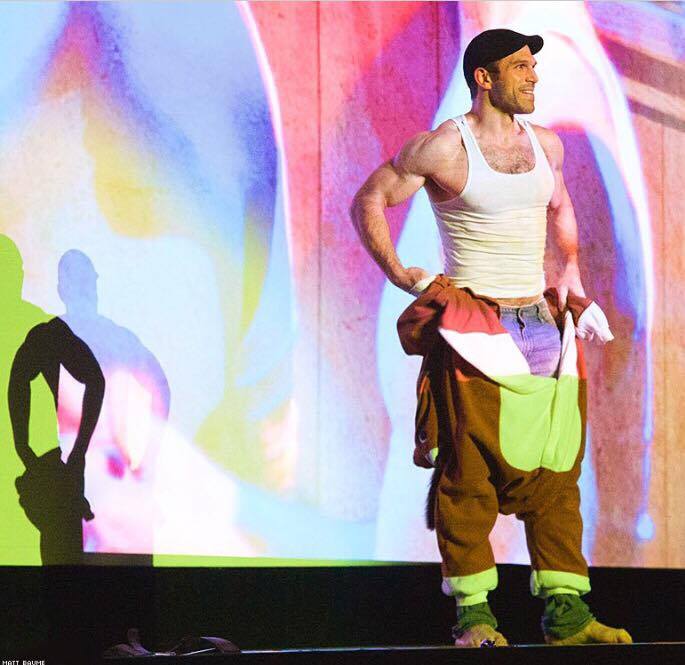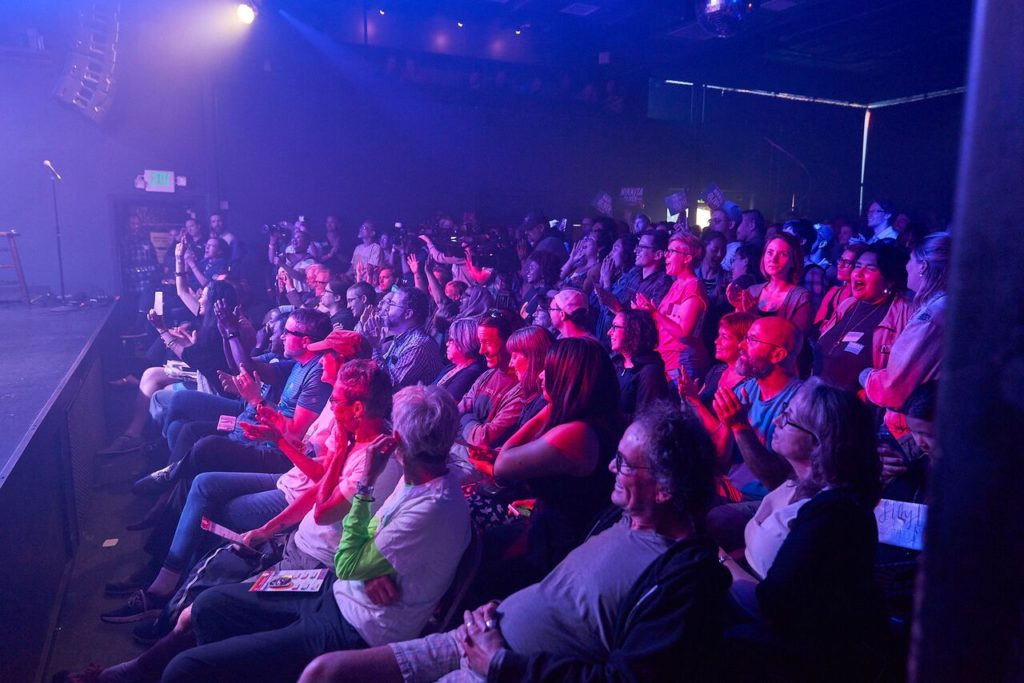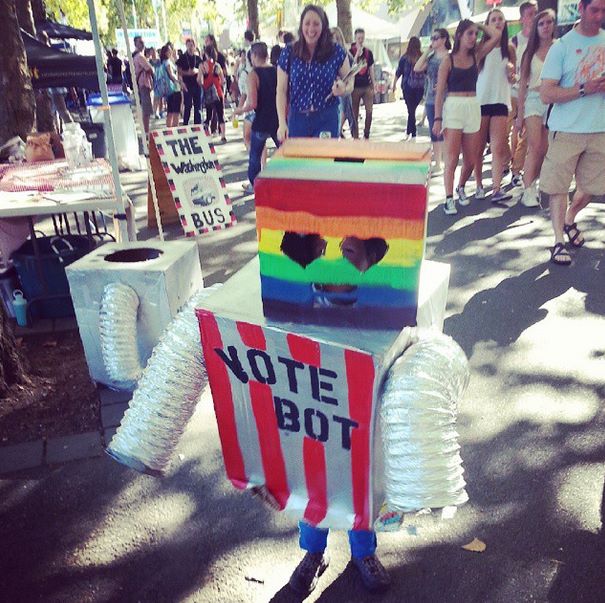by Bus Admin | Oct 29, 2021 | Voting
The Youth Endorsement Leadership League (YELL) is a phenomenal team of young folks who came together this fall to conduct our endorsement process.
The seven participants (Angee, Jesse, Jamie, Jean, Saba, Zubin, Annalisa) came together to identify key races across the state of Washington, and then craft a questionnaire based on the issues important to them. The following endorsements in our 2021 Voter Guide reflect the candidates YELL was most impressed by and The Washington Bus is thrilled to uplift their decisions.
Remember to vote by 8PM on Tuesday, November 2nd!
2021 VOTER GUIDE
by Bus Admin | Apr 22, 2021 | Democracy Reform, Voting
By Linda Phan, Washington Bus Legislative Intern
As a low-income teenager involved in politics, I always struggle with supporting my favorite candidates financially when election season rolls around. In a capitalist society, there has always been a high correlation between money and winning. For me, if I want a candidate who advocates for affordable housing and financial literacy programs to support working class families like mine, how do I compromise my own meager earnings for the prospect of a brighter future with improved legislation?
My dilemma echoes that of other low-income Washingtonians. However, most of us can’t even worry about politics. The looming threat of unpaid bills and empty stomachs rivals the need for progressive candidates tenfold. When politicians are responsible for offering solutions to these problems, it makes sense for those directly impacted by said problems to be the most supportive of the candidates who promise to meet their needs. Yet, the financial and societal consequences of capitalism acts as obstacles in allowing marginalized people to participate in the political arena.
Democracy vouchers are a resource that can mitigate the accessibility issues surrounding electoral politics. Democracy vouchers are available to U.S. citizens, U.S. nationals, or lawful permanent residents (“green card holder”) who live in Seattle and are over the age of 18. It only requires a quick sign up to receive them with the exception of registered voters, who receive them automatically. After signing up, democracy vouchers will be mailed out on a monthly basis. Each resident who signs up will be mailed four vouchers equivalent to $25. Each voucher can go to any candidate who qualifies for the program, and apply to all City elections. In the 2021 election, this applies to candidates in the running for Mayor, City Council, and City Attorney who stay under the respective spending limits of each race. Residents can even choose to give all of their vouchers to one candidate.
With democracy vouchers, voters who have trouble accessing political participation — Black and Indigenous People of Color, youth, immigrants and refugees, the working class, and more — are able to contribute to their favorite candidates’ campaigns regardless of wealth. While other access issues remain, such as the time needed to adequately research candidates, democracy vouchers are one step towards including marginalized communities in political decisions. In the future, I hope other governments follow Seattle’s example in supporting efforts to ensure that the ability to support campaigns is equitable and representative of all voters.

by Bus Admin | Oct 21, 2020 | Uncategorized, Voter Registration, Voting
Leila is the Communications and Outreach Coordinator at the Bus. She’s passionate about making sure voting works for all of us.
Are you a new voter? Does everyone keep telling you to vote, but then forgetting to give you the details? ( We see you Facebook, Snapchat, and every Insta influencer ever). You’ve come to the right place. Let’s break it down.
How do I get registered to vote?
Registering to vote is *easy* in Washington State. You can do it online, with a Washington State ID, or in person (you’ll need a valid form of ID, like your social security card). Register online up until 8 days before election day, at www.registerinwa.org. This election season, that means the deadline is October 26th. If you’d like to check if you’re registered, or update your address, you can visit the voter portal at www.votewa.gov. In Washington, you can register in person all the way up to election day at a vote center. On election day, we have same day registration and voting, meaning you can go to a vote center, get registered, and vote, all in the same day.
Side note… where are the Vote Centers? And what can I expect if I visit one?
Vote centers are available across Washington to register new voters, update current voter records, obtain a voter registration card and to provide assistance to voters who need help completing their ballot. Trained staff and specialized equipment are available to help voters with disabilities cast a private, independent ballot. Each county has at least one Vote Center, which is often the elections office. Many counties also open additional Vote Centers when ballots drop, which is 18 days before election day (Oct 16th this year!). Those hours might vary. You can google “Washington State Vote Centers”, or “King County Voter Centers”, if you live in King County. Your county’s election department website will let you know location and hours.
Am I eligible to vote?
In order to register or pre-register to vote, you need to be 16 years old and a US Citizen, living in Washington State. Sixteen and 17 year olds can pre-register, meaning you’ll automatically be registered to vote when you turn 18.
Ok, I’m registered to vote. Where’s my ballot?
In Washington State, we ALL vote by mail. This means that your ballot will come to the address on your voter registration 18 days before the election. The Secretary of State’s website always has these dates easily available, by the way, so check them out: www.sos.wa.gov. This is why it’s so important to check that your voter registration lists your current address, and update it if not! Again, you can do that at votewa.gov, or at a Vote Center. Did you miss the deadline to update your address, and really don’t want to go to a vote center? The voter portal (again, www.votewa.gov) let’s you print out your ballot. You can also track your ballot there, so you can see when it was sent to you, and when you return it, you can check if it was counted.
I got my Ballot. IT IS SO LONG. How do I figure out what to vote for?
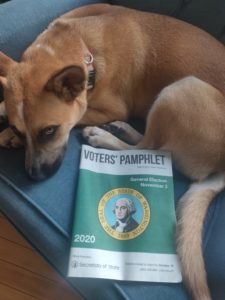
Even pets like the Voter’s pamphlet.
You are right. It is long. In Washington State, we sometimes have up to SEVEN elections a year, depending on where you live, and the ballot can be three pages long, or more. Every voter gets sent a voter pamphlet by the Secretary of State, contains an explanation of the positions up for election on the ballot, and statements from each candidate. For referendums and initiatives, it contains an official explanation and a statement from each campaign stating why they think you should vote no, or yes.
Looking for more info? Another thing to do is check out voter guides. Local newspapers do voter guides and endorsements, issue based organizations do voter guides, and you could even check out local activists and media folks on social media. Fuse does a progressive voters guide, and issue based organizations like Washington Conservation Voters ( who are all about voting in green candidates) release a list of endorsements. The Washington Bus does the same. These are kind of like a cheat sheet – if you think that the organization that released the voter guide represents your values, it can be a good sign if they endorse your candidate or ballot measure. It’s always a good idea to check out several, and do your own research if you have time.
Depending on the year, you could be voting for representation at the federal level, like President, and at the state level, like your Governor and your state Senator. We vote at the county level for your County Executive (like the mayor of your county) and your county council representatives, and at the city level, for Mayor. You could vote for your School Board Representative, who controls so much about how education is funded and implemented, or your City Council-member, who passes municipal laws and helps control how city taxes are spent. Judges control how the criminal justice system is enforced, and can have huge influence on the school to prison pipeline.
Ballot measures are piece of proposed legislation which voters decide on. They are sometimes about implementing a local tax for specific funding, or they could be about implementing a law. Proposition 1, which is on the Seattle Ballot, implements a sales tax to fund public transportation (whoooo Buses!). Referendum 90 asks voters to decide whether comprehensive sex education should be implemented in K-12 schools.
The bottom line is, you don’t have to vote for everything on the ballot – it’s your ballot. However, these local officials and local ballot measures often impact our daily lives so much – everything from whether your community has good public transportation, to if local businesses thrive, to testing requirements in schools. If you’re wondering who these elected officials are, because you’ve never heard of them – that could be a red flag. How much outreach are they doing to your community? Are they passing laws that benefit you and your neighbors? Making sure you vote with your values is the best way to change how local government works and who it represents.
Alright, I filled out my ballot. Are you sure it will be counted?
Heck yeah! You’re on it. Your ballot needs to be filled out in black or blue pen, and you need to make sure it is signed. Your signature needs to match either the signature on your driver’s license or ID, or the signature on your voter registration. Making sure your phone number or email is on your voter registration gives your county elections department a chance to contact you if for some reason your ballot gets flagged because your signature doesn’t match. You can add that information at the voter portal (votewa.gov), or go to a vote center to update your signature.
How do I turn in my ballot?
You can either put your ballot in the mail, no postage required, or put it in a ballot drop box. Every county has a map of where drop boxes are located. For King County, that map is here, and for Pierce County, that map is here. Often they are located at local community centers, libraries, on college campuses, etc.
You need to make sure your ballot is postmarked by Nov 3rd (election day) (meaning the post office received it and marked it as received that day) or put it in a Ballot drop box by 8pm Nov 3rd.
Ok, I did it. That was stressful. How can I make it more fun?
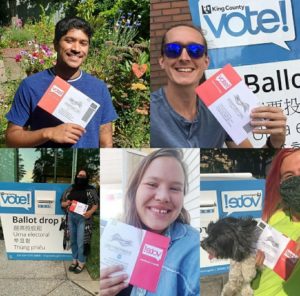
Washington Bus Staff and Friends, getting their vote on!
Call your friends! Do it together (over facetime? #pandemictimes). Get your neighbors to walk to your local ballot box together. Voting is something that our whole community can be a part of – even if you’re not eligible to vote – by reminding and educating each other about the importance of voting in every election.
Congratulations, you did it. Now go remind three friends to vote. You’re amazing for making it through and adding your voice to the ballot box.
Other good things to know:
- Folks with felonies can vote in WA. You need to re-register, and you have to no longer be in community custody (under the authority of the Department of Corrections, or on parole). Check out more details on the SOS website, here.
- Voting with a disability? Accessible Voting Units are available at each Vote Center. Find out more here. You can request reasonable accommodation from the Elections office, according to the Americans with Disabilities Act.
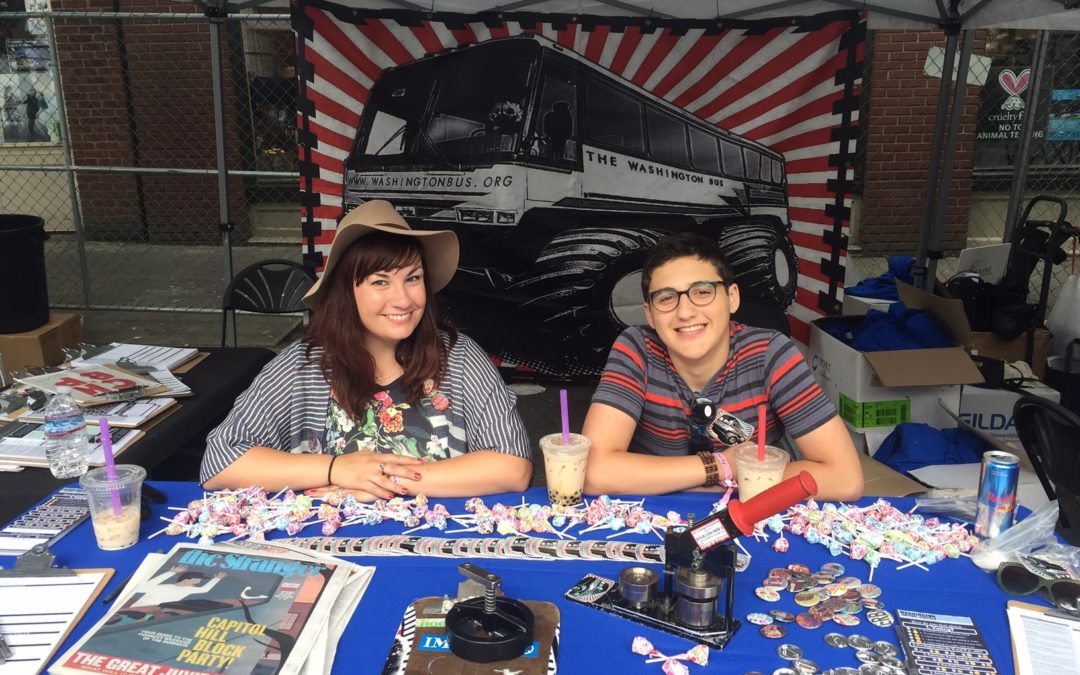
by Bus Admin | Jul 27, 2017 | Arts & Culture, Community Engagement, Events, Voter Registration, Voting
Thirsty Thursday blog post reminding you to VOTE! #knowledgeresponsibly
The deadline to vote for the primary election is August 1st. Don’t forget to mail your ballot or drop it in a nearby dropbox!
Your vote really matters – in state and local elections just a few hundred votes can make the difference. If you live in Seattle, you’ll be helping to narrow down a crowded mayoral primary from 21 candidates down to 2! Plus, voting to determine whether we should create and fund a cultural access program expanding students and underserved populations’ access to arts, science, and heritage programming in King County, as well as voting on a county Executive and city councilmembers.
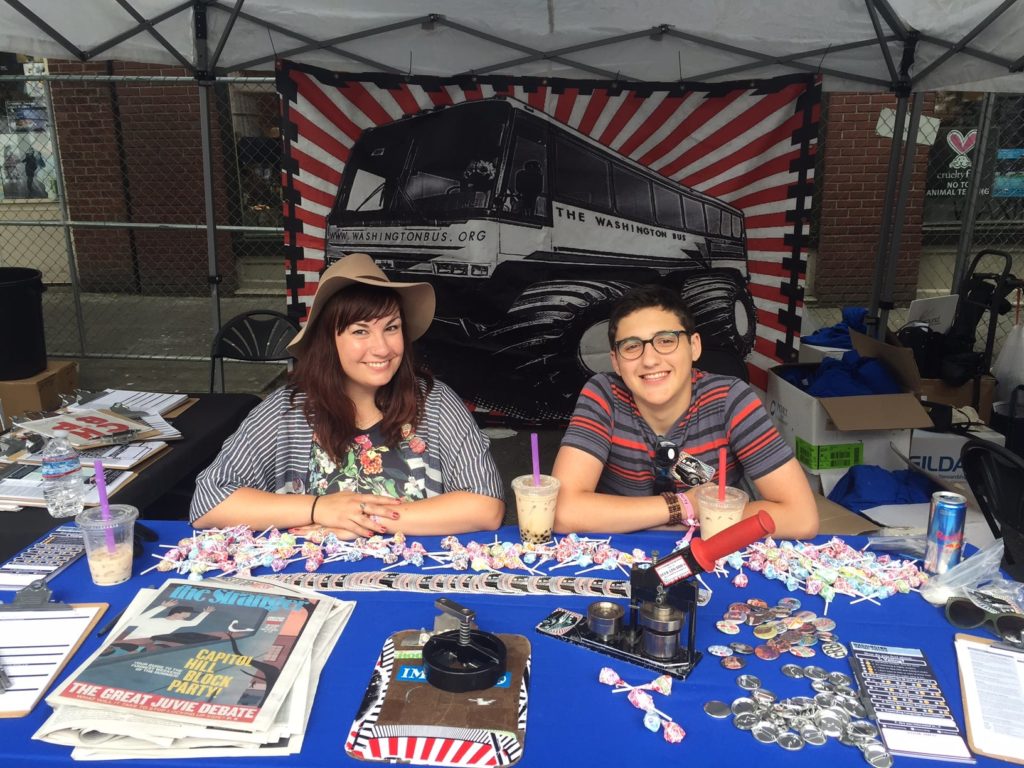 The Bus was out this weekend doing our part to make sure young people are turning out for elections large and small.
The Bus was out this weekend doing our part to make sure young people are turning out for elections large and small.
In order to make politics fun and accessible, we meet young folks where they are – and sometimes that means music festivals! This past weekend the Bus brought out Fellows, interns, and a ton of volunteers to canvass at Capitol Hill Block Party, making sure young folks at the festival were registered to vote and reminding them to turn in their ballots.
In the booth we had a station to make your own buttons, candy, and make-your-own-meme 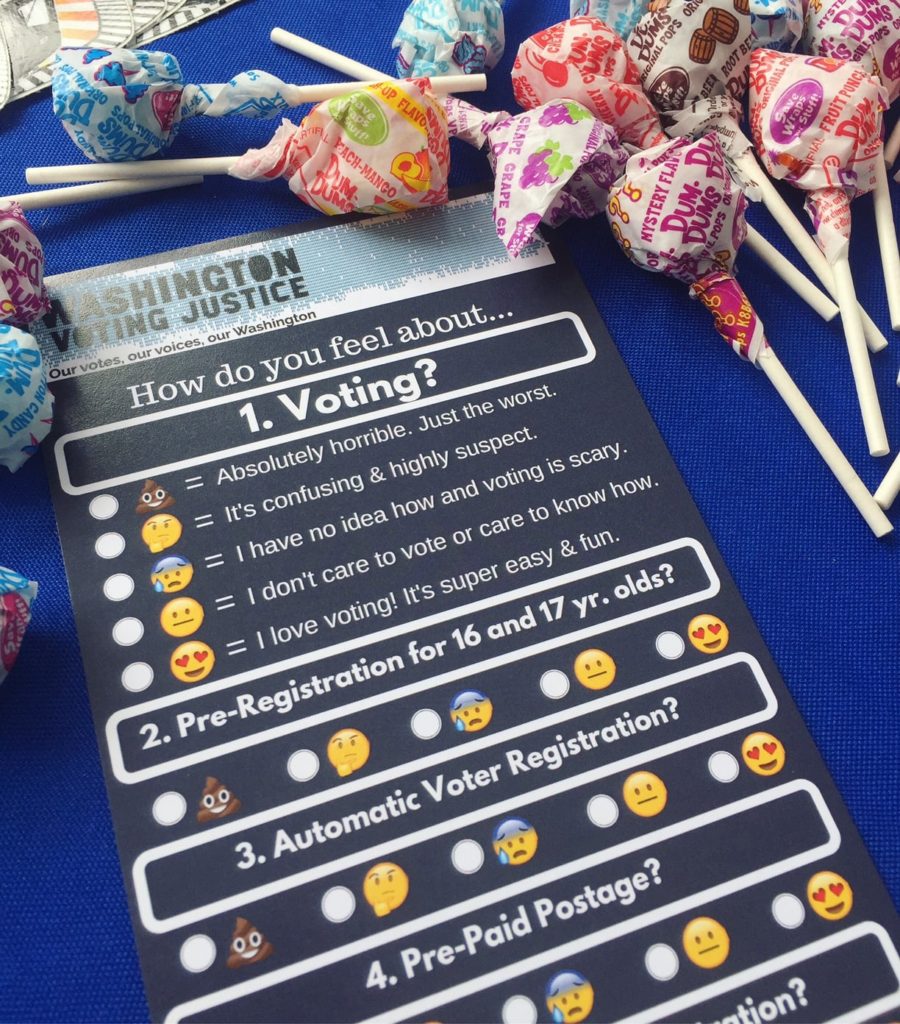 cutouts. While people learned about the Bus and had some fun with us, we made sure their voter registration was up to date, reminded them to turn their ballots in, and engaged them around voting access issues with a survey gauging public support for several strategies that can make voting easier, such as pre-registration for 16 and 17 year olds, automatic voter registration, pre-paid postage, same-day voter registration and language accessibility. By gathering information on the survey, we hope that we can impact the voting systems and make it more accessible. *And it turns out emojis are a very effective tool of measurement everyone can relate to.
cutouts. While people learned about the Bus and had some fun with us, we made sure their voter registration was up to date, reminded them to turn their ballots in, and engaged them around voting access issues with a survey gauging public support for several strategies that can make voting easier, such as pre-registration for 16 and 17 year olds, automatic voter registration, pre-paid postage, same-day voter registration and language accessibility. By gathering information on the survey, we hope that we can impact the voting systems and make it more accessible. *And it turns out emojis are a very effective tool of measurement everyone can relate to.
Many people consider politics to be something serious and unapproachable, and we want to break down barriers that prevent people from fully participating in our democracy. We can express our values, achieve our goals, and make our communities better through voting. While we tackle serious issues, we still want to make sure people associate politics with something fun, something they want to be a part of.
Here I ask again, please get out to vote! Voting matters to you. Voting matters to the community. Voting matters to the entire city and state. Let’s make our voices heard!
This blog post was written by the Bus’s Duke Engage interns, Debra and Anqi.




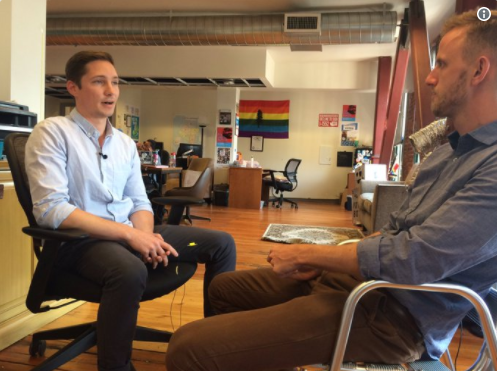

 The Bus was out this weekend doing our part to make sure young people are turning out for elections large and small.
The Bus was out this weekend doing our part to make sure young people are turning out for elections large and small. cutouts. While people learned about the Bus and had some fun with us, we made sure their voter registration was up to date, reminded them to turn their ballots in, and engaged them around voting access issues with a survey gauging public support for several strategies that can make voting easier, such as pre-registration for 16 and 17 year olds, automatic voter registration, pre-paid postage, same-day voter registration and language accessibility. By gathering information on the survey, we hope that we can impact the voting systems and make it more accessible. *And it turns out emojis are a very effective tool of measurement everyone can relate to.
cutouts. While people learned about the Bus and had some fun with us, we made sure their voter registration was up to date, reminded them to turn their ballots in, and engaged them around voting access issues with a survey gauging public support for several strategies that can make voting easier, such as pre-registration for 16 and 17 year olds, automatic voter registration, pre-paid postage, same-day voter registration and language accessibility. By gathering information on the survey, we hope that we can impact the voting systems and make it more accessible. *And it turns out emojis are a very effective tool of measurement everyone can relate to.
